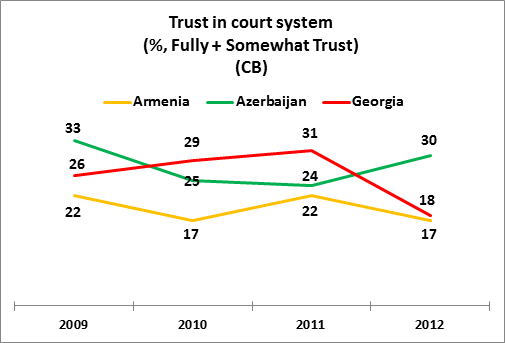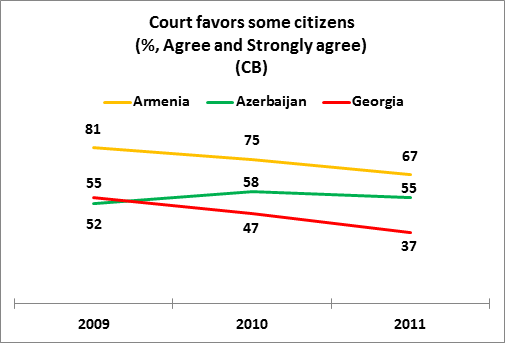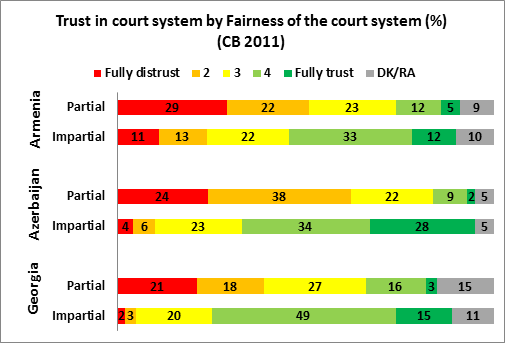Perceptions of Court System Fairness in the South Caucasus
According to 2010 ESS data, Eastern and some Southern European countries tend to be less trusting of both police and court systems than Nordic countries, as well as less believing that these institutions are legitimate holders of judicial power. In the case of court systems, the South Caucasus populations are also skeptical. Each year the Caucasus Barometer (CB) asks respondents to assess their level of trust towards their court system. According to the 2010 CB, just under one third of Azerbaijanis (30%), and less than one fifth of Armenians (17%) and Georgians (18%) said they trusted their respective court system (the sum of “fully trust” and “somewhat trust”). In the latter two countries, the trust in the court system fell by 5% and 13%, respectively during the last 2 years (from 2011 to 2012). In contrast, Azerbaijanis have indicated slightly more confidence in their court system – trust increased from 24% in 2011 to 30% in 2012.

From 2009 to 2011 the CB also asked to what extent people agreed or disagreed with one of the following statements--“The court system in their country favors some citizens” or “The court system in their country treats all citizens equally”. The results indicate that most frustration about the court system is felt in Armenia where two thirds (67%) of the population in 2011 thought that the court system was unjust and favored some citizens. However, this percentage has gradually decreased from 81% in 2009. A similar situation is observed in Georgia where from 2009 to 2011 these figures fell from 52% to 37%. In Azerbaijan the percentage change from 2009 to 2011 was low at 3%. Thus, the majority of adult citizens in Armenia and Azerbaijan believe that their court system treats favors some citizens over others. It is thus noticeable that the more the court system is perceived to favor some citizens is, the less there is trust in the court system.


Despite the fact that the independence of courts is guaranteed by the constitutions and laws of Georgia, Armenia and Azerbaijan, many people in the South Caucasus still believe that the court system is unjust. A fair justice system can help to create an environment in which those subjected to a crime can seek justice, and those committing a crime can be held accountable under the law.
If you would like to explore more about trust in various institutions in the region, please visit http://www.crrc.ge/oda/
The development of Azerbaijani think tanks and their role in public policy discourse
By Zaur Shiriyev
Think Tanks in Armenia: Who Needs their Thinking?
By Yevgenya Jenny Paturyan
Think tanks are considered to be an important part of civil society: providers and keepers of expertise on important social, economic, environmental, political and other issues. Organizations like Chatham House and Carnegie Endowment for International Peace come to mind. In addition to ‘pure’ think tanks, there is a plethora of organizations that combine research with advocacy and action, Transparency International being a prominent example.
The lay of the land: An interview with Hans Gutbrod on think tanks in the South Caucasus
[Editor's note: This is the second in a series of blog posts co-published with On Think Tanks. The views expressed within this blog series are the authors alone, and do not represent the views of CRRC-Georgia.]Interview by Dustin Gilbreath
Thinking about think tanks in the South Caucasus
By: Dustin Gilbreath
What do CB interviewers’ ratings of respondents’ intelligence tell us?
Citizenship in action in the South Caucasus
Finding work in Armenia and Georgia
CRRC’s third annual Methodological Conference: Transformations in the South Caucasus and its Neighbourhood
Who trusts the police in Georgia?
Trust in institutions in the South Caucasus – generating a combined score
On courts and trust: Perceptions of the judiciary in Georgia
Trust and Distrust in Political institutions in Azerbaijan
ქალები საქართველოში და სექსი ქორწინებამდე
საქართველოში დემოკრატიის მხარდაჭერა მცირდება
Before and After the Elections: Shifting Public Opinion in Georgia
Trust in Institutions in the South Caucasus
Smoking in the South Caucasus and tobacco policy in Azerbaijan
Finding a good job in Georgia
Trust in local government in Georgia
CRRC Methodological Conference on Measuring Social Inequality in the South Caucasus and its Neighborhood
When is a war not a war?
Expectations and the EU Association Agreement
Friends and Enemies in the South Caucasus
Trends in the Data: Public support for democracy is slowly waning in Georgia (Part 2)
Analysis of survey findings from the last few years, presented in the first part of this blog post, shows that public support for democracy is declining in Georgia. Since 2012, the share of the population who would prefer democracy over any other kind of government dropped from 68% to 47%. As public support for democracy is indispensable to democratic consolidation, it is important to know how and why support for democracy is changing. This blog post describes a number of tendencies that might be related to the declining public support for democracy in Georgia, using the CRRC’s Caucasus Barometer (CB) survey data.In the South Caucasus, the Enemy of my Enemy is my Friend
The recent history of the South Caucasus as seen by the world’s media – Part 1, Armenia and Azerbaijan
The recent history of the South Caucasus as seen by the world’s media - Part 2, Georgia
State capacity in the South Caucasus: How do you measure how much the state can do?
მონაცემებში ასახული ტენდენციები: სოციალური და პოლიტიკური ინსტიტუტების მიმართ ნდობის ცვლილება სომხეთში
CRRC-ს მიერ ცოტა ხნის წინ გამოქვეყნებული ბლოგის მიხედვით, საქართველოში სხვადასხვა სოციალური და პოლიტიკური ინსტიტუტის მიმართ ნდობა 2011-დან 2015 წლამდე დაეცა. ეს ბლოგი, კავკასიის ბარომეტრის მონაცემებზე დაყრდნობით, მიმოიხილავს ნდობას იგივე ინსტიტუტების მიმართ სომხეთში.Do Think Tanks in Georgia Lobby for Foreign Powers?
By Till Bruckner
Common challenges, common solutions
By Dustin Gilbreath
Household income and consumption patterns in Georgia
2015 EU survey report: Major trends and recommendations
Democracy in Georgia
Fatalism and Political Perceptions in Georgia
Spreading the News: File Sharing through Mobile Phones in Armenia
E-transparency in Georgia: A key to faith in democracy?
The Caucasus Barometer 2010 Dataset Is Available!
ODA – CRRC Data Analysis Online
If You Were Asked What Everyone Else Thought of Your Country...
Blood Donation in the South Caucasus: Refill, Please!
Seminar Report: Perceptions about Georgia: Leading or Loosing the Struggle for Democracy
Caucasus Barometer: Unpacking Public Trust in the President
Carnegie Research Fellowship Program | Winners Announced
Engagement without recognition?
Is the South Caucasus a homogenous region?
Fancy Living Abroad? 39% of Young Armenians Say "Preferably Forever"
Georgia & Russia | Russian Analytical Digest
Obstacles for Civil Society Development in the South Caucasus
Counting Crowds & Crowds Counting | Jacobs' Method
During the last 25 years Georgian capital has experienced a diverse history of political meetings in its central areas including peaceful demonstrations, rallies with radical political demands, “tent towns” and so forth. The higher the attendance, the more legitimate the protests are often seen to be. As a result, the figures themselves usually are contested, sometimes in significant controversy.Women in Parliament: How Do Georgia, Armenia and Azerbaijan Compare to Other Countries?
Expanding on the topic of a previous blog, this post compares statistics on the number of women in national parliaments in the South Caucasus and other areas of the world. The countries of the South Caucasus rank low on women’s participation in parliament compared to many other countries.Abortion rates in the South Caucasus among the highest in the world
The Level of Trust in Government Institutions in Georgia: The Dynamics of the Past Three Years
Caucasus Barometer | A New Name for the CRRC's Data Initiative
Levels of trust in the banks in Georgia: Changes over the past two years
Post-Soviet States’ Democratic Decline: Results from Freedom House Report
Attitudes toward the West | Caucasus Analytical Digest
Georgian get-togethers: Private Problems versus Politics
In September 2011, CRRC on behalf of Eurasia Partnership Foundation and EWMI G-PAC conducted a nationally representative survey on Volunteerism and Civic Participation in Georgia. Georgians were asked how often they get together and discuss private problems and politics with their friends and relatives (who do not live in their houses).The CRRC Georgia Team
These are the CRRC Georgia team members who work hard on the numbers we usually present!Is the Caucasus in Europe or Asia? | Tim Straight at TEDxYerevan
Friends Are Hard To Come By: Friendship Divides by Gender in Azerbaijan
Overcoming Negative Stereotypes in the South Caucasus
Policy Attitudes towards Women in Azerbaijan: Is Equality Part of the Agenda?
USAID Political Party Assessment of Europe and Eurasia
Georgian Party Archive: extraordinary Soviet History
Exit Polls | Take Two
Caucasus Data: Tolerance towards Others
Cuil for the Caucasus? A quick test!
Russian-Georgian Relations | Alex Rondeli on July 29
What do Russians think about the situation in Abkhazia and South Ossetia? -- Data Snapshot
South Caucasus Data 2007 on Unemployment
McCain vs Obama: Caucasus preferences
World Economic Forum Gender Gap Index | a few surprises
Weak State Institutions | Weak Social Capital?
Freedom House Report | Democracy in the Caucasus
Caucasus Election Programs in the 1990s
History vs Public Policy
Snapshots on Attitudes towards Education
Student Migration from the South Caucasus
Three months before the 2016 Parliamentary elections: Trust in the Central Election Commission and election observers in Georgia
The June 2016 CRRC/NDI Public attitudes in Georgia survey, conducted three months before the Parliamentary elections, provides interesting information about trust in the Central Election Commission (CEC) and election observers, both local and international.Changes in public opinion between 2011 and 2017
A lot changed in Georgia between 2011 and 2017, including the government. New promises and new regulations have been made and new priorities set by politicians. A visa free regime with the Schengen zone countries came into force. An ultranationalist ‘Georgian March’ was organized. A Georgian priest was charged with conspiracy to murder the Secretary of the Patriarch of the Georgian Orthodox Church, the most trusted institution in Georgia. This list is by no means exhaustive, but it does raise questions about whether and how public opinion has changed against the backdrop of these and other events.Do people in Georgia see the government as a parent or as an employee?
Based on CRRC’s Caucasus Barometer survey data, this blog post describes how people in Georgia see the government, as a “parent” or as an “employee”, and how this differs by settlement type, gender, and education level.The Caucasus Barometer survey regularly asks people, “Which of the following statements do you agree with: “‘People are like children; the government should take care of them like a parent’ or ‘Government is like an employee; the people should be the bosses who control the government.’” Approximately half of the population of Georgia (52%) agreed in 2017 with the former statement and 40% with the latter. Responses to this question have fluctuated to some extent over time, but overall, attitudes are nearly equally split.
Is Georgia’s Orthodox Christian population losing (trust in) their religion?
Surveys conducted in Georgia have repeatedly shown that the Georgian Orthodox Church’s leader Patriarch Ilia II is the most trusted public figure in the country. Yet, CRRC’s Caucasus Barometer survey data from 2008 to 2017 suggests that both the share of Orthodox Christians in Georgia that trust the Church and the degree to which they trust the Church is on the decline. Although the survey does not provide direct evidence, the scandals surrounding the church in recent years could have contributed to this. For instance, in 2017, a priest was convicted of attempting to poison the Secretary of Ilia II. The government has sold land to the Church at symbolic prices on numerous occasions, often leading to negative media coverage. In 2013, priests were involved in an anti-LGBT rights riot.NGOs in Georgia: Low trust, high expectations? (Part 1)
Over the last decade, people in Georgia have reported rather low levels of trust toward NGOs. At the same time, when asked during surveys to assess specific aspects of NGO activities, the answers have usually been positive. This blog post is based on the findings of a survey on attitudes toward NGOs collected by CRRC-Georgia in fall, 2017 for the Georgian Civil Society Sustainability Initiative (CSSIGE). The first part of this blog post looks at the most up-to-date data on knowledge of NGOs in Georgia and reported levels of trust toward them. The second part explores the inconsistency between low trust toward NGOs in Georgia, on the one hand, and quite positive assessments of their activities, on the other hand.NGOs in Georgia: Low trust, high expectations? (Part 2)
As discussed in the first part of this blog post, the results of CRRC-Georgia’s survey conducted for the Georgian Civil Society Sustainability Initiative (CSSIGE) project in fall 2017 confirmed that both knowledge about NGOs and trust toward them is quite low in Georgia. This blog post looks at the inconsistency between low trust toward NGOs, on the one hand, and quite positive assessments of their activities, on the other hand.საარჩევნო გარემო ეთნიკური უმცირესობებით კომპაქტურად დასახლებულ არეალებში უარესდება
„CRRC საქართველოს“ გამოკითხვის შედეგების მიხედვით, საარჩევნო გარემო ყველაზე მეტად პრობლემატური უმცირესობებით კომპაქტურად დასახლებულ რეგიონებშია და მდგომარეობა უფრო უარესდება.2018 წლის საპრეზიდენტო არჩევნები, განსაკუთრებით კი — მეორე ტურში დატრიალებული მოვლენები შესაძლოა, ქვეყნის დემოკრატიული განვითარების გზაზე უკან გადადგმულ ნაბიჯად ჩაითვალოს. პირველ და მეორე ტურებს შორის მთავრობამ განაცხადა, რომ არჩევნების შემდეგ დაახლოებით 600 ათასამდე მოქალაქეს ვალებს ჩამოაწერდა, რაც, ზოგიერთი დამკვირვებლის აზრით, ამომრჩეველთა მოსყიდვად უნდა ჩათვლილიყო...
Who doesn’t want democracy for Georgia?
After the collapse of the Soviet Union, Georgia adopted western-style democratic institutions. They have never functioned in a fully democratic manner, fluctuating between more liberal and authoritarian tendencies. That is, Georgia is and has been a hybrid regime.But what do people want?
Pessimism about Georgia’s direction hides room for optimism
While a large number of Georgians think the country is going in the wrong direction, the fact that they are judging the country’s performance based on issues rather than political partisanship alone is a good sign.უზენაესი სასამართლოს მოსამართლეების შერჩევა: რა იცის და რა დამოკიდებულება აქვს ხალხს საქართველოში ამ პროცესის შესახებ
საკონსტიტუციო ცვლილებებისა და საქართველოს ორგანულ კანონში შესული ცვლილებების შედეგად, უზენაეს სასამართლოში მოსამართლეთა მინიმალური რაოდენობა 28-მდე გაიზარდა. გარდა ამისა, მოსამართლეობის 10-წლიანი ვადაუვადო დანიშვნის წესით შეიცვალა და პარლამენტის წინაშე მოსამართლეობის კანდიდატების ნომინირების უფლება იუსტიციის უმაღლეს საბჭოს გადაეცა. შესაბამისად, იუსტიციის უმაღლესმა საბჭომ უზენაესი სასამართლოს მოსამართლეობის კანდიდატების შერჩევის პროცესი დაიწყო და 2019 წლის სექტემბრის დასაწყისში გამოაქვეყნა იმ 20 კანდიდატის სია, რომელიც პარლამენტს წარუდგინეს დასამტკიცებლად. კანდიდატებთან გასაუბრება პირდაპირ ეთერში გადაიცემოდა. შერჩევის პროცესი ქართულმა მედიამ საკმაოდ ფართოდ გააშუქა.In a sea of pessimism, who is optimistic about Georgia?
The CRRC and NDI survey released two weeks ago showed a pessimistic picture – half the public thinks Georgia is going in the wrong direction, 24% that nothing is changing, and only 19% think it is going in the right direction. A majority (59%) think the country is not a democracy for the first time since the question was asked on the survey in 2010. Moreover, performance assessments of government, parliament, the courts, and most ministries declined.Trust in institutions continues its steady decline in Georgia
Trust in institutions has been on the decline in Georgia for a decade now. For instance, the level of trust in religious institutions declined from 86% of the public reporting trust in 2008 to 71% in 2019, with the decline being particularly prominent among Orthodox Christians, the main religious group in the country.ანალიზი | საეკლესიო სკანდალები ზიანს აყენებს საქართველოს მართლმადიდებელი ეკლესიის მიმართ ნდობას
ბოლო წლების განმავლობაში საქართველოს მართლმადიდებელი ეკლესია არაერთ სკანდალში გაეხვა. იქონია თუ არა ამ სკანდალებმა გავლენა მოსახლეობის ნდობაზე ეკლესიის მიმართ?
2017 წელს ერთერთ მღვდელს ბრალი წაუყენეს და გაასამართლეს საქართველოს კათალიკოს პატრიარქ ილია მეორის მდივნის მკვლელობის მცდელობისთვის. ასევე, იყო გახმაურებული შემთხვევები, რომლებიც სახელმწიფოს მიერ ეკლესიისთვის მიწების სიმბოლურ ფასად გადაცემას შეეხებოდა...
There is a gap between support for democracy and liberal values in Georgia
Public opinion polls suggest support for democracy is on the decline in Georgia, but does support for democracy correlate to support for liberal values?
An increasing number of Georgians view their country as ‘a democracy with major problems’, with CRRC’s Caucasus Barometer survey showing the share of people reporting this belief to have increased from 27% in 2011 to 48% in 2019.
In parallel to this growing scepticism towards the country’s democratic situation, surveys show a decline in the proportion of the population believing that democracy is preferable to any other kind of government, falling from 65% in 2011 to 49% in 2019.
Support for democracy increased in Georgia during COVID-19, but what does that mean?
The COVID-19 outbreak generated discussion about whether support for democracy would decline during and after the crisis. While reported support increased, this did not necessarily match support for democratic means of governance.
Data from the CRRC’s COVID-19 monitor shows that more people in Georgia reported support for democracy compared to the pre-crisis period. However, as before the crisis, support for democracy does not seem to be grounded in the values commonly associated with democratic governance.